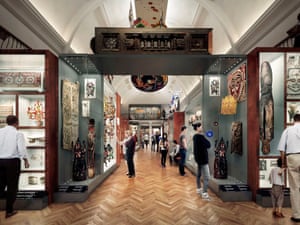South London’s much-loved Horniman Museum is planning to open a major new gallery that will showcase more than 3,000 objects from around the world. With a focus on “fascinating objects that tell extraordinary stories”, the 600-square-metre World Gallery will explore what it means to be human, celebrating “human creativity, imagination and adaptability.” It is due […]
South London’s much-loved Horniman Museum is planning to open a major new gallery that will showcase more than 3,000 objects from around the world.
With a focus on “fascinating objects that tell extraordinary stories”, the 600-square-metre World Gallery will explore what it means to be human, celebrating “human creativity, imagination and adaptability.” It is due to open in June 2018.
The new gallery will occupy half of the Horniman’s existing building in Forest Hill and cost £4.6m. As well as a receiving a £3.3m Heritage Lottery Fund grant, the museum has also launched a crowdfunding campaign, calling on its visitors to help it raise an extra £30,000 towards the project.

With anthropology at the centre of the museum, it will show the way people from every continent live their lives. Exhibits will cover a diverse array of objects: from lucky charms to ancient pottery, and feature a 15th-century bronze casting from Lagos, Nigeria, as well as the prow of a Libyan refugee boat, found in Italy in 2013.
Robert Storrie, keeper of anthropology at the Horniman, said: “The displays will show how things connect people – practically and emotionally – as well as giving each of us a glimpse into other ways of understanding our world.”
Founded in 1901 by tea trader and philanthropist Frederick John Horniman, the museum has a collection of 350,000 objects, specimens and artefacts. Conceived as a “gift to the people”, to this day entry to the museum and gardens remains free. It is hugely popular and is regularly praised as one of the country’s best museums for families.
































